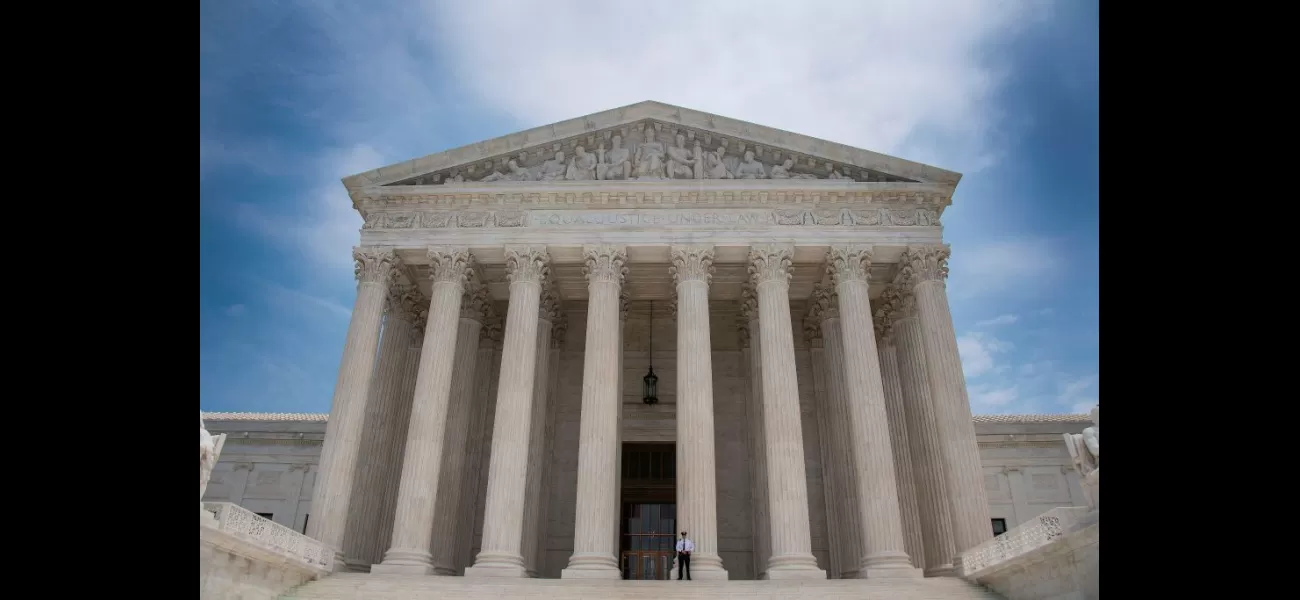ACLU wins a major victory for LGBTQ workplace rights with Supreme Court ruling.
The Supreme Court ruled that workers do not need to demonstrate the disadvantage reaches a specific level of significance.
May 1st 2024.

The American Civil Liberties Union (ACLU) recently made a significant announcement regarding workplace equality. This comes after the Supreme Court issued a ruling on April 17, which has been hailed as a major win. The case in question, Muldrow v. City of St. Louis, focused on the protection of employees under Title VII of the Civil Rights Act. The court's decision stated that discrimination in lateral transfer of employees is prohibited under this act. The plaintiff, Jatonya Clayborn Muldrow, had accused the city of gender-based discrimination when she was denied an employment transfer and her own request was turned down.
Muldrow had been working as a plainclothes officer in the St. Louis Police Department from 2008 to 2017. However, a new commander in the Intelligence Division requested that she be replaced by a male officer. Despite her desire to continue in her role, the department reassigned her to a different position. While her pay and rank remained the same, the new role did not come with the same benefits she had before.
When Muldrow challenged this decision, she faced hurdles at the U.S. Court of Appeals for the Eighth Circuit. The court ruled that she had to prove that the transfer had caused a "material employment disadvantage" and ultimately denied her request. It was also stated that it was not enough that the transfer had affected the "conditions" of her employment.
However, the Supreme Court's decision affirmed that employees like Muldrow are protected under Title VII from discriminatory transfers that put them at a disadvantage. In their ruling, the court made it clear that employees do not have to meet a certain level of significance in order to prove their claim. According to the court document, "Although an employee must show some harm from a forced transfer to prevail in a Title VII suit, she need not show that the injury satisfies a significance test. Title VII's text does not establish such a high bar."
Ming-Qi Chu, Deputy Director of the ACLU's Women's Rights Project, praised the court's decision, calling it a big victory for workers. She pointed out that in the past, courts have often dismissed cases under the "materially" or "significantly" adverse standard, even when the employee's discrimination claim was valid. This, she believes, goes against the text of the statute and undermines Congress's goal of eliminating discrimination in the workplace when Title VII was passed.
The ACLU also addressed the potential backlash from those who oppose diversity, equity, and inclusion (DEI) efforts. Chu acknowledged that some may view this ruling as a threat to their cause. However, she stressed that conservative actors against DEI often use fear-mongering tactics to shut down training and initiatives. In her words, "The fear-mongering of DEI opponents has no basis in law and fundamentally misunderstands how most DEI programs work. The purpose of DEI and other remedial workplace programs is to improve the process by which employment decisions are made and close the gap in opportunities among workers. They do not disadvantage any particular worker. This is why they have long been held lawful. These scare tactics are trying to chill employers' commitment and investment in expanding workplace opportunities. We won't let them."
Despite this ruling, efforts to eliminate DEI programs continue to spread across companies and higher education institutions. However, it is important to note that this decision only serves to promote equality in the workplace, and it affirms that the severity of an employee's claim does not have to reach a certain threshold.
Muldrow had been working as a plainclothes officer in the St. Louis Police Department from 2008 to 2017. However, a new commander in the Intelligence Division requested that she be replaced by a male officer. Despite her desire to continue in her role, the department reassigned her to a different position. While her pay and rank remained the same, the new role did not come with the same benefits she had before.
When Muldrow challenged this decision, she faced hurdles at the U.S. Court of Appeals for the Eighth Circuit. The court ruled that she had to prove that the transfer had caused a "material employment disadvantage" and ultimately denied her request. It was also stated that it was not enough that the transfer had affected the "conditions" of her employment.
However, the Supreme Court's decision affirmed that employees like Muldrow are protected under Title VII from discriminatory transfers that put them at a disadvantage. In their ruling, the court made it clear that employees do not have to meet a certain level of significance in order to prove their claim. According to the court document, "Although an employee must show some harm from a forced transfer to prevail in a Title VII suit, she need not show that the injury satisfies a significance test. Title VII's text does not establish such a high bar."
Ming-Qi Chu, Deputy Director of the ACLU's Women's Rights Project, praised the court's decision, calling it a big victory for workers. She pointed out that in the past, courts have often dismissed cases under the "materially" or "significantly" adverse standard, even when the employee's discrimination claim was valid. This, she believes, goes against the text of the statute and undermines Congress's goal of eliminating discrimination in the workplace when Title VII was passed.
The ACLU also addressed the potential backlash from those who oppose diversity, equity, and inclusion (DEI) efforts. Chu acknowledged that some may view this ruling as a threat to their cause. However, she stressed that conservative actors against DEI often use fear-mongering tactics to shut down training and initiatives. In her words, "The fear-mongering of DEI opponents has no basis in law and fundamentally misunderstands how most DEI programs work. The purpose of DEI and other remedial workplace programs is to improve the process by which employment decisions are made and close the gap in opportunities among workers. They do not disadvantage any particular worker. This is why they have long been held lawful. These scare tactics are trying to chill employers' commitment and investment in expanding workplace opportunities. We won't let them."
Despite this ruling, efforts to eliminate DEI programs continue to spread across companies and higher education institutions. However, it is important to note that this decision only serves to promote equality in the workplace, and it affirms that the severity of an employee's claim does not have to reach a certain threshold.
[This article has been trending online recently and has been generated with AI. Your feed is customized.]
[Generative AI is experimental.]
0
0
Submit Comment





